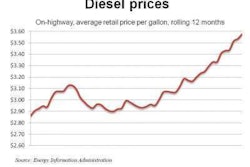
The American Trucking Associations announced its support of the Federal Motor Carrier Safety Administration’s proposed prohibition on the use of handheld mobile phones, though it urged the agency to allow the use of hands-free devices, citing agency research demonstrating the net safety benefits of such devices.
“ATA’s progressive safety agenda calls for the safe use of technology, and our associations’ policy calls for laws and regulations that ban all motorists from using handheld mobile phones while driving,” says Bill Graves, ATA president and chief executive officer. “Recognizing the risks of handheld mobile phone use, it simply makes sense to prohibit their use by all motorists to make the highways safer for everyone.”
To this end, ATA has supported laws and regulations banning handheld phone use for all motorists at the state and federal levels. ATA reiterated this position in comments filed Tuesday, Feb. 22, on FMCSA’s proposed ban for truck drivers. Last year, ATA supported DOT’s ban on texting by drivers of commercial vehicles while their vehicles are in motion.
However, while ATA agreed with FMCSA that “drivers should be prohibited from dialing a telephone number while driving,” it urged the agency not to limit drivers from pushing “a limited number of buttons in order to initiate a hands-free call.” ATA also objected to the proposed prohibition on reaching for a mobile phone while driving.
Doing so, ATA argued, would prevent drivers from initiating hands-free calls which, as the agency’s research demonstrates, can have a net safety benefit. Further, ATA claimed, it is inconsistent to permit drivers to reach for other objects but prohibit reaching for a cell phone.
FMCSA’s proposal to ban handheld cell phone use by commercial vehicle drivers operating in interstate commerce was published in the Federal Register on Dec. 21. Initial comments were due by Feb. 22 and could address any issue raised in the NPRM and the background documents in the docket. Reply comments are due by March 21.









